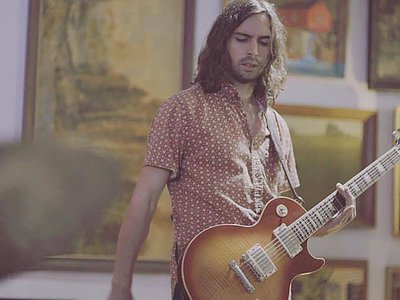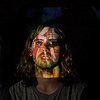Could you take us through a day in your life, from a possible morning routine through to your work? Do you have a fixed schedule? How do music and other aspects of your life feed back into each other - do you separate them or instead try to make them blend seamlessly?
The last 12 months have been so variable day to day. I lived in Memphis and Chicago, and did a bunch of shows and traveling all over the US, Europe, and Australia. And the tours we do are not glamorous. It’s a gamble every night whether there will be 4 people or 50 there. Financially it swings from a joke to decent. It’s been impossible for me to get into a routine, other than the moving around routine. If I have a few days with nothing to do, I get a bit restless. I don’t really separate music from the rest of my life, it’s all blended together. Probably not ideal as there are a lot of ups and downs to deal with haha!
Could you describe your creative process on the basis of a piece or album that's particularly dear to you, please? Where did the ideas come from, how were they transformed in your mind, what did you start with and how do you refine these beginnings into the finished work of art?
My theory is having the instrument in your hand as much as possible. You don’t have to sit down with the intention to write, but you do have to have the intention to play and screw around. I’d rather sit around and daze off with the guitar for an hour than schedule a sit down with the intention to write a new song. I recently wrote a new song called Deadly Stare. I was just laying on the floor playing, and it came about. But it only came about because I make an effort to have the guitar in my hands playing. When I start droning on a new song, I bring a small lyrical idea into play right away, and then expand on that feeling later. Gives it direction.
There are many descriptions of the ideal state of mind for being creative. What is it like for you? What supports this ideal state of mind and what are distractions? Are there strategies to enter into this state more easily?
I haven’t found a single state yet that works best. Seems like the range and swing of emotions is what helps, and not a particular state. And to experience a range of emotions, you have to have a wide palette of experiences, relationships, etc. So I try and keep an open mind to new things and ideas. Easier said than done. Creativity is a large part just hard work, and understanding that is important to me. It can be dangerous to rely on creativity because it won’t always be there, and you need the work ethic to back you up. Social media is a huge distraction. When you go on Facebook or Instagram for a while, you feel tired afterwards, and you tell yourself, wow I just did a lot of work. But really you did nothing, and now you are too tired to work on things that are actually important.
How is playing live and writing music in the studio connected? What do you achieve and draw from each experience personally? How do you see the relationship between improvisation and composition in this regard?
They aren’t connected for me. Two different mentalities. I didn’t sing for a long time, so I get a personal satisfaction every time I complete a show, even if it’s not the best performance. I still get a kick out of it. I’ve learned to deal with things going wrong on stage. I don’t get down about those things unless they happen over and over. Almost all my studio experiences have been with the band in control, no interference from a producer or over eager engineer. It might seem strange, but I’d love to experience the other end, having someone with very strong ideas, almost telling me what to do. I’d be curious what the result would be.
How do you see the relationship between the 'sound' aspects of music and the 'composition' aspects? How do you work with sound and timbre to meet certain production ideas and in which way can certain sounds already take on compositional qualities?
Jake: The sound aspects of music I equate to tone, instrumentation and timbre. All of sound and tone are tools in which to realize your idea of a composition. On the other hand, the act of limiting the sounds you have to work with, or exploring a certain sound in depth can have the ability to inspire compositional ideas. However, I think that certain sounds have the ability to inspire certain compositional ideas. If a musician has all the instruments in the world at his disposal, it would often be more difficult to create a creative piece than if he or she were to limit the sounds or instruments that they could use in a certain song. We have songs where we explore things like tuning all the strings on the guitar to one note, or only deciding to use mallets or brushes. Or saying we'd like to record a certain song live with X # of people. I think some of our most creative songs come out of a place where we limit ourselves.
Art can be a purpose in its own right, but it can also directly feed back into everyday life, take on a social and political role and lead to more engagement. Can you describe your approach to art and being an artist?
Music is still very valuable on an individual and small group (concert) scale. The whole idea of songs changing the world or bringing peace and love has more or less failed though. I write songs that I hope individuals can connect to. Mostly about relationships, feeling seen in a big world, and coming of age. It’s self expression for me, and it’s a success even if only a few people relate. I’m not trying to make anyone feel anything specific and I don’t have a political agenda with my music. That could change, but it’s just where I’m at right now. Live music is still an amazing exchange of emotions. The audience feels a part of something, and the performer feels their work is valued.
It is remarkable, in a way, that we have arrived in the 21st century with the basic concept of music still intact. Do you have a vision of music, an idea of what music could be beyond its current form?
Music is an amazing tool to change your mood and offer relief from other things happening in life. Relating to lyrics can help you understand there are others out there dealing with the same issues. As long as people are living, loving, growing apart, growing closer, fighting, and letting loved ones go, there will be music to help cope or heighten these experiences. It’s important to keep bringing in fresh ideas, new tunings, instruments, etc. There are already moments when I feel bored with certain processes of making music, so delving into more difficult ideas is essential.



